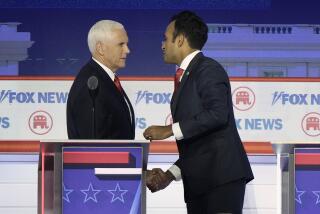Politics of Personal Cliche Is a GOP Favorite
- Share via
WASHINGTON — It’s a Clintonian legacy that Republicans--even those who most revile the man from Chappaqua--have embraced with great enthusiasm: the Politics of Personal Destruction.
Not the practice, the phrase. In recent months, Republicans have outnumbered Democrats by about 7 to 1 in using a phrase that lends moral chagrin to what once was known simply as “smear campaigning.”
The funny thing is--well, let the users speak for themselves.
“I know Bill Clinton coined the phrase,” said Linda Chavez, President Bush’s would-be Labor secretary.
“I know it’s Bill Clinton’s phrase,” said Larry Klayman, best known in Washington for his dogged pursuit of the Clintons through the courts.
“Yes, I do know it’s Clinton,” said freshly anointed George W. Bush aide Mary Matalin, who used it twice in five minutes this weekend on NBC’s “Meet the Press,” her last appearance as a pundit.
“It’s become a cliche,” lamented Kathleen Hall Jamieson, dean of the Annenberg School for Communication at the University of Pennsylvania. She said what was once a useful phrase is “crossing into the realm of meaninglessness.”
An archival search of the 2000 campaign and its aftermath found that Republicans led the Democrats 7-to-1 in using the phrase: from a fracas over an old firearms arrest in an otherwise unwatched Oklahoma congressional race to Bush himself, swatting away criticism of his efforts to duck South Carolina’s Confederate flag free-for-all. After the election, it became a favorite of Katherine Harris defenders in Florida.
One of the few recent instances of Democratic use was in July, when Hillary Rodham Clinton complained about reports that she used an anti-Semitic slur decades ago.
Her husband coined the phrase in 1994, when allegations of fraudulent land dealing in Arkansas started to dominate headlines.
“I do not believe that the politics of personal destruction is what the American people are interested in,” he said at a news conference on March 8 of that year. Evidently, he liked it: Within days, he was using the phrase at Democratic fund-raisers.
Jamieson, who analyzes American political rhetoric, said the phrase was one of the more notable presidential legacies to the language--although it fell far short of Ronald Reagan’s “evil empire” quote. Clinton had tapped into frustration with tabloid politics.
“People were saying we should not be engaging in politics to destroy other persons or ideas,” she said. “We should be forcefully designating areas of disagreement.”
She traces Republican appropriation of the phrase to late 1998, around the time a slew of extramarital revelations surfaced about members of Congress prosecuting Clinton during the impeachment hearings.
It was a rare occurrence. “We’d just coined a political phrase both sides are comfortable with,” she said.
Not for long. Now, she says, the phrase is used by the party in power to inhibit legitimate discourse--for instance, Matalin’s dismissal of the continued Florida vote count.
Matalin said her objections were with the presumption that Republican officials in Florida were putting personal good before that of the state. “It was used to impugn personal motives, to make ad hominem attacks not relevant to any policy debate,” she said.
Republicans say their increased use is natural and stems from looser Democratic standards.
“The Clinton administration gathered information through illegal means,” said Klayman, whose organization, Judicial Watch, filed a suit on behalf of hundreds of Republicans whose FBI background files were collected by the Clinton White House.
Chavez, who repeatedly used the phrase when her candidacy for Labor Department post was torpedoed by revelations that she housed an illegal immigrant, said it goes both ways.
“I defended Clinton in my column during the whole Paula Jones thing,” she said. “That was ridiculous.” And the man himself? Does he deserve creator’s credit?
“It was a good phrase,” Chavez conceded.
More to Read
Get the L.A. Times Politics newsletter
Deeply reported insights into legislation, politics and policy from Sacramento, Washington and beyond. In your inbox three times per week.
You may occasionally receive promotional content from the Los Angeles Times.










